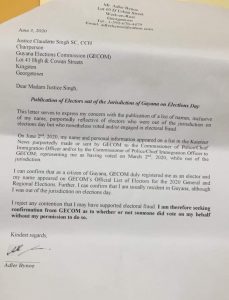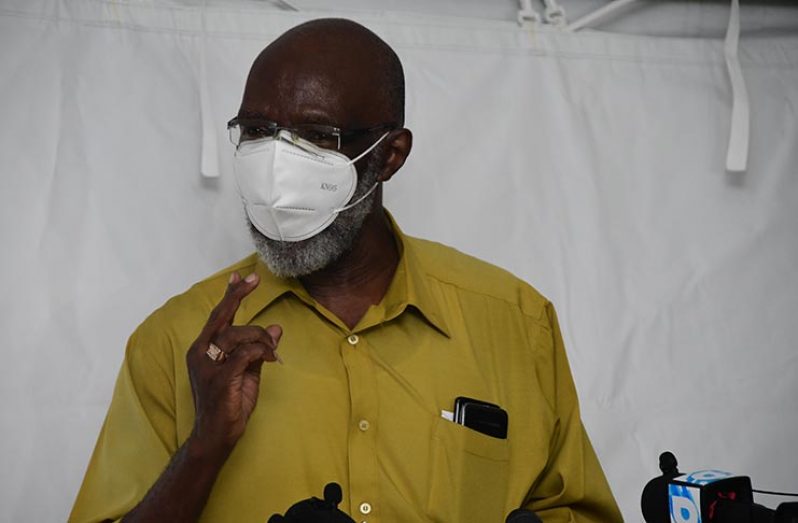…GECOM commissioner says electoral process has been breached
…says credibility of polls has to do with whether system was corrupted or not
ELECTIONS Commissioner Vincent Alexander said there is clear evidence that Guyana’s General and Regional Elections were compromised, as he cited cases in which unscrupulous people voted in the place of persons who were either dead or out of the country when the elections were held on March 2.
“Now the fact of the matter is that where we’re at, there is proof that the system has been breached; it has been breached,” Alexander told reporters on Thursday at the Arthur Chung Conference Centre (ACCC), even as he explained that there is sufficient evidence to suggest that there are persons on the Official List of Electors (OLEs), who were out of the country on polling day, but have been marked off as having voted.

One such person is Adler Bynoe of Werk-en-Rust, Georgetown. Bynoe was listed among 172 persons whom the Commissioner of Police and Chief Immigration Officer, Leslie James confirmed were out of the jurisdiction on Elections Day, and according to the A Partnership for National Unity + Alliance For Change (APNU+AFC) were marked off on the OLE as having voted.
In a letter to the Chair of the Guyana Elections Commission (GECOM), Justice (Ret’d) Claudette Singh on Wednesday, June 3, 2020, Bynoe confirmed that had been out of the jurisdiction as indicated by the chief immigration officer, and therefore could not have voted. “I can confirm that as a citizen of Guyana, GECOM duly registered me as an elector and my name appeared on GECOM’s Official List of Electors for the 2020 General and Regional Elections. Further, I can confirm that I am usually resident in Guyana, although I was out of the jurisdiction on Elections Day,” Bynoe wrote.
Bynoe made it known that he is not a part of any scheme to perpetrate electoral fraud. “I reject any contention that I may have supported electoral fraud,” Bynoe made clear while “seeking confirmation from GECOM as to whether or not someone did vote on my behalf without my permission to do so.”
To date, APNU+AFC has cited more than 1,200 such cases in which persons are alleged to have voted in the place of electors who were out of Guyana. While Bynoe has confirmed that he was out of the jurisdiction on March 2, other individuals, who are reportedly listed on the list provided to GECOM by the commissioner of police, are alleging that they were present in the country and therefore exercised their franchise.
But Alexander, while emphasising that there is scope for reconciliation and correlation, reminded media operatives that the list was submitted to the police commissioner by GECOM based on APNU+AFC’s contention. “A list was presented, and that list was presented in keeping with the allegation that here are persons whose serial numbers were identified in the workstations who have been voted for,” he explained. He further explained that once a serial number is called out by a political party at the level of the workstation, verification takes place to ascertain whether or not a person’s name has been ticked off as having voted.
“The APNU+AFC verified the serial numbers that were ticked off. Anybody who is involved in the election process verifying a serial number, can go to a source document, and verify the names. That’s a fact, this is not something to be argued; this is a fact. My construct is based on fact, my construct is not an imagination, my construct is based on fact, irrefutable fact,” the elections commissioner reasoned.
In addition to the provisions of Lists of Electors who were out of the jurisdiction on Elections Day, APNU+AFC has submitted a number of death certificates for persons who reportedly have been marked off on the OLE as having voted as well. Further to that, the APNU+AFC highlighted a number of other irregularities such as missing poll books, Certificates of Employment, OLEs, Oaths of Identity and an alarming number of unstamped or incorrectly stamped ballots, which have been deemed rejected.
These irregularities have been included in Observation Reports, which will be summarised by Electoral District and submitted to the elections commission along with the tabulated votes for deliberation in accordance with the gazetted Order.
“The chairman was very pellucid previously that evidence must be produced; and if evidence has been produced then there could be no choice but to see if the evidence justifies the allegation,” the commissioner said.
Questioned whether the magnitude of the irregularities would be the determining factor, Alexander said not necessarily. “I don’t think the issue of credibility is merely an issue of comparison of numbers; the issue of credibility has to do with whether the system was corrupted or not, and so therefore my measurement, my yardstick is not to compare a margin between parties, my yardstick is to ask the question, is there evidence that this process has been corrupted, and if it has been corrupted, can we declare it credible”? he explained.
Safeguards

But were there enough safeguards in place to prevent electoral fraud? According to Alexander, the electoral system, as it is, has loopholes that cannot be ignored. The commissioner pointed to his earlier calls for house-to-house registration to be conducted so as to generate a National Register of Registrants (NRR) from which the Preliminary List of Electors and Official List of Electors are extracted. Guyana, he posited, went into the 2020 General and Regional Elections with a bloated list.
“I was one of the advocates for a new list because in my humble opinion, if you have a bloated list, and not withstanding what some people are saying, we do have a bloated list. The mere mathematics of population of 750,000, a school population of 250,000 persons, cannot allow you to have a list of 661,000 persons, so we have a bloated list; that is beyond question; that is beyond reason,” he reasoned.
The commissioner contended that a bloated List of Electors creates a platform for persons to cheat the electoral system. “My disposition was that once you have a bloated list, then you are providing a platform for the possibility of the human factor to invade the process; the human factor I meant to be, and still mean to be, how would biased human beings who are part of the system seek to manipulate that situation,” Alexander explained.
He added that the country’s demography is also a contributing factor. “My argument was and is, and this has nothing to do with any particular party, it has to do with the reality of society, that if you have that demography, and you have a bloated list, then you are providing for an opportunity for things, untoward to happen,” he said.
These loop holes, he posited, have been alluded to by political parties in the past, particularly during court actions and therefore cannot be ignored, simply because they were party agents within polling stations on Elections Day. “These safeguards not perfect or absolute, and what you have to perfect is not just the safeguards but the entire system, and the extent to which we have a bloated list, the system remains imperfect, and allows for certain demography, and the human factor to impact the system,” he said.




.jpg)











